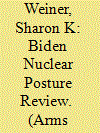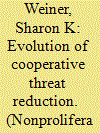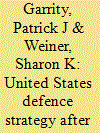|
|
|
Sort Order |
|
|
|
Items / Page
|
|
|
|
|
|
|
| Srl | Item |
| 1 |
ID:
183355


|
|
|
|
|
| Summary/Abstract |
As the Biden administration finalizes its Nuclear Posture Review (NPR), it faces the same challenges as the architects of the four earlier NPRs: how to make choices about nuclear deterrence and translate them into nuclear strategy and force structure. If it chooses to learn from the experience of its predecessors, the administration will confront two sets of requirements that are central to U.S. nuclear deterrence policy yet limit its freedom of action. The NPR managers would be wise not to just buy into those requirements but instead to be explicit and transparent about questioning them in order to enable choices that are based on a clear understanding of the trade-offs, as well as other possible options.
|
|
|
|
|
|
|
|
|
|
|
|
|
|
|
|
| 2 |
ID:
089071


|
|
|
|
|
| Publication |
2009.
|
| Summary/Abstract |
Since its beginning in 1991, Cooperative Threat Reduction (CTR) has grown to include a host of programs aimed at securing former Soviet weapons of mass destruction, weapons-relevant materials, and expertise. Multiple U.S. and Russian agencies are involved, and some programs have expanded beyond the former Soviet Union. CTR has demonstrated considerable success, but much work remains. Moreover, it is likely that the CTR agenda will be re-evaluated and refocused owing to reviews by the Obama administration, increasingly strained relations with Russia, and the global economic crisis. Any such analysis, however, should proceed from a clear understanding of both CTR's performance to date as well as lessons learned from this experience. This article provides a start by summarizing progress toward CTR's main goals, outlining the scope of remaining tasks, and looking at persistent problems in both the United States and Russia. In particular, CTR's future progress depends upon forging a new U.S. domestic consensus on the national security benefits of CTR, encouraging Russia to become a true partner in CTR activities, and improving interagency leadership and coordination. In turn, these improvements can help resolve emerging questions about the cooperative nonproliferation agenda as it expands beyond the former Soviet Union.
|
|
|
|
|
|
|
|
|
|
|
|
|
|
|
|
| 3 |
ID:
087599


|
|
|
|
|
| Publication |
2009.
|
| Summary/Abstract |
The collapse of the Soviet Union in
the early 1990s raised concerns about
the security of its nuclear weapons.1
In response, the United States joined
forces with countries of the former Soviet
Union, especially Russia, as well as
the European Union and other states,
to create a series of programs aimed
at securing former Soviet weapons of
mass destruction (wmd), weaponsrelevant
materials, and scienti½c expertise.
Of these efforts, the most troubled
has been the one aimed at containing
wmdskills and knowledge. Former Soviet
weapons experts haven't sold their
knowledge around the world; indeed,
there have been almost no documented
cases of such proliferation (although
concerns remain about what goes unreported).
Rather, it is the means chosen
for ½ghting such proliferation-working
with and reemploying wmdexperts
-that have proven problematic.
|
|
|
|
|
|
|
|
|
|
|
|
|
|
|
|
| 4 |
ID:
084939


|
|
|
|
|
| Publication |
2008.
|
| Summary/Abstract |
The collapse of the Soviet Union raised concerns about the fate of its nuclear weapons and led the United States to fund what came to be known as Cooperative Threat Reduction (CTR). This includes programs that fight the proliferation of weapons expertise by providing short-term income and eventual re-employment of former Soviet WMD experts in civilian fields. Using case studies, based on archival research and extensive interviews, this article argues that CTR's three main 'knowledge non-proliferation' efforts have largely failed at their given task. Although programs have worked with many former Soviet WMD experts, few have been re-employed. Each program has also come to emphasize the number of people engaged rather than re-directed and to have less regard for their WMD skills. Moreover, this shift in goals, and the metrics each program uses to measure progress, led to serious political disputes between Moscow and Washington. Besides being unable to demonstrate success at their original non-proliferation goals, these programs use metrics that threaten to upset the fragile US domestic political consensus for future work in Russia.
|
|
|
|
|
|
|
|
|
|
|
|
|
|
|
|
| 5 |
ID:
173020


|
|
|
|
|
| Summary/Abstract |
U.S. efforts to produce and maintain the plutonium cores of its nuclear weapons have endured a troubled history of safety and environmental problems since the first plutonium was produced in Hanford, Washington, in 1944. These hollow metal cores, each weighing several kilograms, enable the initial, explosive chain reaction in nuclear weapons.1 The last pit production facility at Rocky Flats was closed in 1989 due to widespread contamination and negligence. In the 1990s, pit production essentially stopped as arsenals declined. Although pit production was eventually relocated to Los Alamos National Laboratory, the lab struggled to produce more than a handful, if any, pits in any given year.
|
|
|
|
|
|
|
|
|
|
|
|
|
|
|
|
| 6 |
ID:
108808


|
|
|
| 7 |
ID:
015648


|
|
|
|
|
| Publication |
Spring 1992.
|
| Description |
57-76
|
|
|
|
|
|
|
|
|
|
|
|
|
|
|
|
|
|
|
|
|